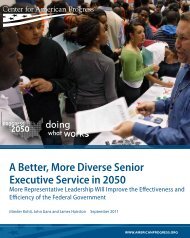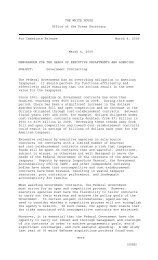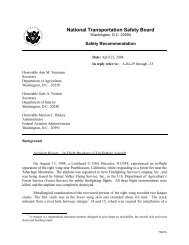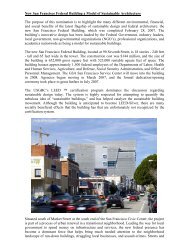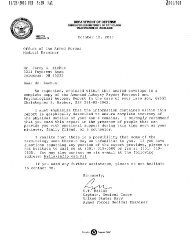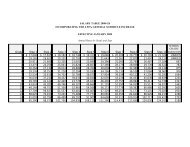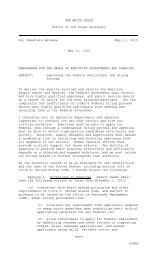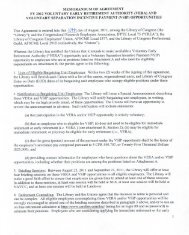Accenture's fifth annual global e-government study
Accenture's fifth annual global e-government study
Accenture's fifth annual global e-government study
Create successful ePaper yourself
Turn your PDF publications into a flip-book with our unique Google optimized e-Paper software.
The country is also hard at work on implementing a<br />
national electronic identification card for citizens. It<br />
has already delivered 37,000 electronic identification<br />
cards and an additional 82,000 cards are expected to<br />
be delivered within a very short time. The <strong>government</strong><br />
plans to have all citizens supplied with a card<br />
by the time of the next federal elections in 2007.<br />
The citizen’s card makes it possible for citizens to<br />
have online access to their files with <strong>government</strong>;<br />
request documents online (e.g., birth certificate); and<br />
exchange information with <strong>government</strong> and other<br />
parties in a secure way. Furthermore, a number of<br />
new applications will be possible.<br />
Belgium’s strong performance in 2003 reflected the<br />
country’s efforts in developing customer-focused<br />
services. Then, the launch of the country’s first<br />
superportal coincided with a strong overall improvement<br />
in customer relationship management that<br />
gave the country a big boost in the rankings. This<br />
year, although the focus was primarily on building<br />
eGovernment enablers, the country also had several<br />
customer-facing successes worth noting.<br />
Specifically, the Belgian portal, www.belgium.be,<br />
launched a number of useful services. It introduced<br />
a service called Web DIV that allows citizens to<br />
order their license plates online. In another example,<br />
citizens can now declare their income online<br />
and calculate their tax returns via tax-on-web<br />
(https://www.belgium.be/taxonweb/app/page/<br />
public/). In its first year of offering tax filing online,<br />
the Belgian <strong>government</strong> received 57,000 electronic<br />
declarations of taxes (or about 2 percent of the total).<br />
The <strong>government</strong> also launched eCommunities through<br />
the portal. This application has been accessible to civil<br />
servants since April 2003. The aim of eCommunities<br />
is to enable communication, cooperation, and<br />
knowledge management and sharing within crossdepartmental<br />
networks of expertise. System<br />
functionality includes document management,<br />
simple and advanced search capabilities, content<br />
management, and joint working tools. The first<br />
eCommunities have been initiated by departments<br />
dealing with horizontal issues (such as personnel<br />
and organization, information and communications<br />
technology, budget and audit) and they currently<br />
include approximately 1,000 members.<br />
The portal also provided online results for the election<br />
on May 18, 2003, in a one-day eDemocracy event.<br />
One point missing from Belgium’s current set of<br />
priorities is improving take-up of eGovernment services<br />
among the country’s citizens. Last year we<br />
emphasized that Belgium has a significant challenge<br />
in increasing take-up among citizens. We found<br />
little evidence this year to suggest that the Belgian<br />
<strong>government</strong> is actively encouraging citizens to use its<br />
services. Governmental efforts seem more inclined<br />
toward simply getting people to use the Internet. In<br />
this regard, Belgium is having success. For example,<br />
the <strong>government</strong> has recently promoted the use of<br />
broadband and as a result, the country now has very<br />
high ISDN and broadband take-up. Again, this is<br />
seen as an enabler for eGovernment.<br />
Still, Belgium has only a moderate level of regular<br />
Internet users—about 41 percent of the population.<br />
More significantly, about half of these regular<br />
Internet users have rarely or never visited a <strong>government</strong><br />
website. Younger users, who have a higher<br />
Internet use, are even less likely to use eGovernment<br />
than older ones. This segment should be building<br />
their eGovernment habits now. Therefore, encouraging<br />
trial will continue to be key.<br />
Our citizen survey also shows that the regular<br />
Internet users would prefer transacting with the<br />
<strong>government</strong> via the Internet (as opposed to via phone,<br />
mail or in person), if given the choice. Additionally,<br />
when citizens are using the services they are generally<br />
reporting a good experience. For example, the<br />
most popular transactional service, tax filing, rated<br />
well. In its first year of availability, the <strong>government</strong><br />
received 2 percent of total declarations this way.<br />
Those who did so in our survey were positive about<br />
the experience. The potential is significant.<br />
As Belgium looks ahead to the future of its public<br />
administration, it must focus more attention on promoting<br />
usage among its citizens. Fewer than half of<br />
those who use the Internet on a regular basis think<br />
their <strong>government</strong> is doing a good or excellent job<br />
developing its online <strong>government</strong> resources. Take-up<br />
is still the issue. The <strong>government</strong> is right in that it<br />
must work to get more of its general population<br />
online. However, the potential value to be gained in<br />
increased customer satisfaction, operational efficiency<br />
and cost savings is too great for promoting<br />
online services to be deferred until the future.<br />
65




